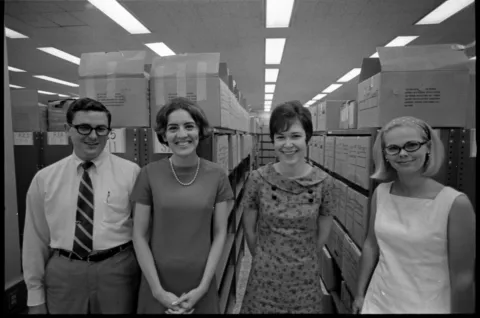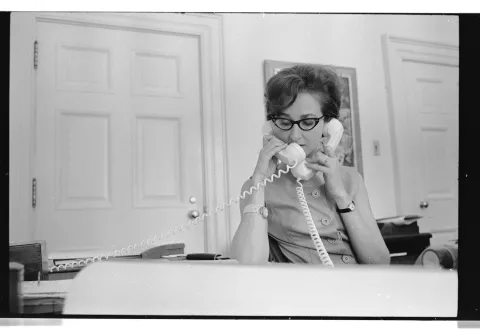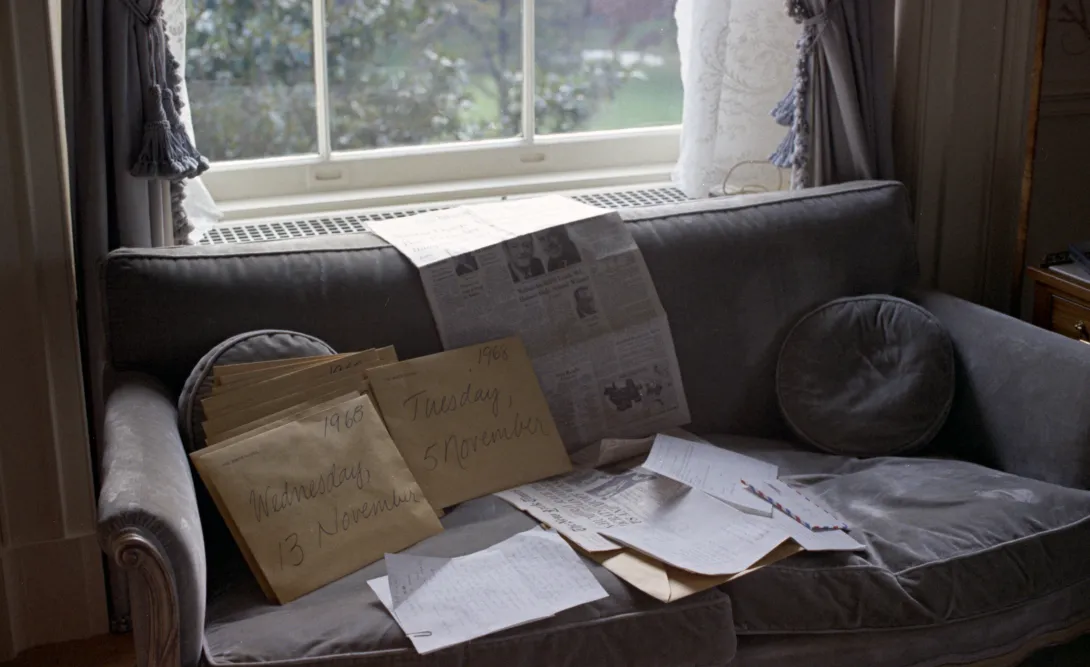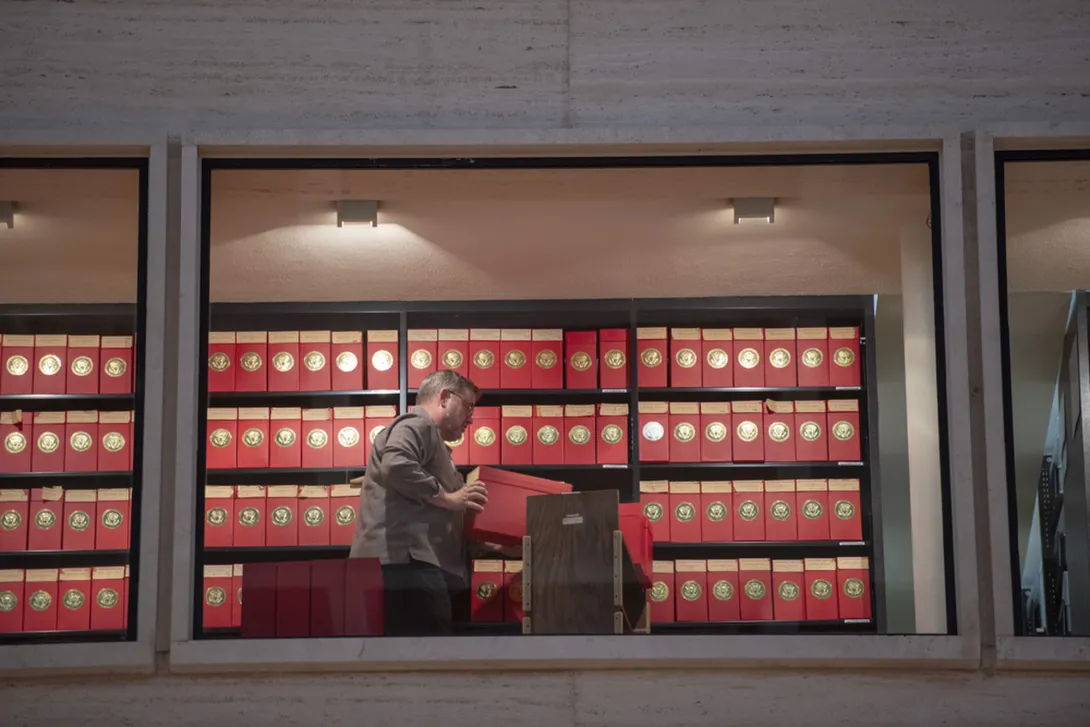Learn more:
For definitions, please see the Glossary page.
DiscoverLBJ is a digital library of collection descriptions, digitized items, and reference material assembled at the LBJ Library over the years to assist our researchers.
On January 20, 1969, the presidency of Lyndon B. Johnson ended. The records from LBJ's White House were officially transferred to the National Archives and sent to Austin, TX, where they were joined by personal papers donated by the President's friends and associates; federal records; audiovisual records and oral histories, records from LBJ's early life; and other related collections.
Since 1971, thousands of researchers from around the world have written, called, emailed, and visited the LBJ Library Reading Room to ask questions about Lyndon Johnson's life and times. The archives staff at the Library helps them find answers in the records. DiscoverLBJ facilitates exploration of our digitized records, descriptions, and reference tools by anyone, anywhere. It also provides direct links to full descriptions in the National Archives Catalog where online researchers can explore all of NARA's holdings. DiscoverLBJ is generously supported by the LBJ Foundation.
See LBJLibrary.org for more about the Library.

About our holdings
The LBJ Library houses more than 45 million pages; an extensive audiovisual collection, including more than 650,000 photos and 5,000 hours of recordings; and approximately 2,000 oral history interviews. The Papers of Lyndon B. Johnson, which form the core of the Library's holdings, include:
- the White House files of Lyndon B. Johnson's presidency, 1963-1969
- papers from his Vice Presidency, 1961-1963
- papers from his time as a U.S. Senator, 1949-1961
- papers from his service as a U.S. Congressman, 1937-1949
In addition, the Library holds the papers of several hundred other individuals, including family, friends, and associates of Lyndon B. Johnson and members of his presidential administration.
Holdings highlight: about the White House records
The LBJ Library has hundreds of collections, but the records of the Johnson administration are the most requested. Like all records, they are cast into a particular form by the technology of the time when they were created. The Johnson administration White House offices did not use computers. Secretaries had typewriters, carbon paper, and primitive photocopiers; diplomatic messages were sent by cable (example). Telephone conversations were sometimes recorded on vinyl dictabelts for secretaries to later transcribe and type up.
Many working documents were still written by hand and little was automated. Without computers, there was no automatically generated facial recognition or location data: instead, White House photographers printed their images as contact sheets like this one to make edits, and jotted down who was in them and when they were taken. Even important documents may be handwritten, especially those that did not necessarily involve secretaries: speech drafts, for example, were often unsigned and edits handwritten and uncredited.
Files, sixties-style
Professional secretaries and file clerks maintained organized files of documents arranged in manilla folders that had each folder's contents written or typed on the label for ease of retrieval. The original folder information eventually became incorporated into collection folder title lists. More about folder title lists here.
Folder titles and subjects are often repeated in multiple collections since they were maintained separately in different offices. Documents are also duplicated, because these pre-computer filing systems used photocopies (often of just the first page) and index cards to create cross-references so a record could be found quickly by looking up names, dates, or subjects.
Copies were also created in the course of business: memos were sent to multiple White House offices for comment, for example. There are often multiple places to look for a single record.

Staff and collections
In the White House, LBJ's aides (assistants) each had secretaries who handled their filing, among other duties. Most of these documents were sent to filing systems set up to handle the large volume of paperwork, like the National Security Files (used by foreign policy staff) and White House Central Files (domestic). Others were maintained separately and became what we now call Aides Files or even personal papers.
There were additional file systems used while President Johnson was in the White House. Some were carried over from the pre-Presidency, like the speech collection Statements of Lyndon B. Johnson. Others were specific to the White House, like the President's Daily Diary, which was maintained by LBJ's secretaries. There were separate files for various White House offices, including the White House Photo Office. Lady Bird's staff maintained the Social Files, and she also had her own diaries and the records associated with them.
Most of our collections reflect how they came to the LBJ Library: they remain associated with the offices and people in the 1960s White House and are organized accordingly. More on archival provenance here.
Fully digitized collections and series on DiscoverLBJ
Individual folders on a variety of topics also available. See Start Here for how to find them.
Pre-Pres:
- LBJ and Lady Bird's Courtship Letters [about]
- LBJ and Lady Bird Post-Courtship Letters [about]
- Pre-Pres Daily Diaries [about]
- VP Telephone Transcripts [about]
Presidential:
- Telephone conversations [about]
- President's Daily Diary [about]
- White House Photo Office contact sheets [about]
- Lady Bird Johnson's Audio Diary and Transcripts [about]
- Tom Johnson's Notes of Meetings [about]
- Meeting Notes [about]
- National Security File, NSC Meetings [about]
- National Security File, Memos to the President [about]
- National Security File, NSAMS [about]
- McCone Memorandums
- Office Files of Yoichi Okamoto [about]
- Administrative History of the Arms Control and Disarmament Agency [about]
Personal Papers:
- Bundy, William
- Durr, Virginia
- Janeway, Eliot
- Johnson, U. Alexis
- Mangan, James W.
- Pattillo, James Cato

FAQ
DiscoverLBJ
How can I improve my search results?
Try to pick a search term that is specific and likely to appear in the original record text or folder title. Even if a record is not yet available online, you can explore searchable collection descriptions and folder title lists to find related collections throughout the List of Holdings. We offer folder scans of most collections for $0.25/page.
The amount of detail in digital Item descriptions varies widely. Folders in particular have very little since they usually contain multiple documents that are not described individually. Where available, the text of scanned textual records is included in the search results but the OCR is uncorrected.
The telephone conversation recordings are not full-text searchable so hits will come from archivists' extensive content notes: you can find a list of abbreviations and subjects here. Records in other collections are best accessed by the Specific Date calendar in the search and may not have any other description. Definitions of the all item fields available here.
We are adding material--both scanning and processing--all the time, so check back for updates, or contact us.
How do I look up a citation?
Look for four pieces of information in the citation:
- LBJ Library (or LBJ Presidential Library, Lyndon B. Johnson Library, etc.)
- Collection name
- Box number
- Folder title
Navigate to the collection using the List of Holdings or search for the folder title list using a keyword from the folder title (usually in quotes) in the citation. Note: The latter method may be less reliable since some folder title lists were created on typewriters.
Unfortunately, footnotes are often truncated due to space constraints and key information can be missing. Without a valid collection name, citations usually cannot be verified. Less often, collections change names or box numbers. For reference, our citation guide is available here.
How do I get permission to use something I found on DiscoverLBJ?
You do not need permission from the LBJ Library to use our digital items, but some items may remain copyright protected and it is the researcher's responsibility to contact the copyright holder for permission.
Many of our digitized materials are in the public domain. For many others, the collection may be public domain but individual items may not be. See the glossary for which fields have rights information.
Is everything on DiscoverLBJ the same as in the Reading Room?
Not necessarily. There may be delays in updating DiscoverLBJ as materials are released and researchers should contact us for the most recent versions of some files.
Scanned folders may also differ slightly from the paper copies. In some cases we have digitally processed the scanned image to try to improve legibility. The original remains available via the Reading Room. Folders containing published materials or multiple identical copies of documents may have items omitted from the scan, in favor of a processing note that explains their omission.

Research
How do I make a research appointment?
Contact us with your general topic at least one week in advance of when you want to arrive. Details on LBJLibrary.org.
What if I can't come to Austin?
We offer folder scans of most textual collections for $0.25/ page. Email us with your desired collection, box, and folder title. You could also hire an independent proxy researcher.
Other
How are archives different from museums? Are archivists the same as historians?
Museums like the one at the LBJ Library often select archival objects to tell a story, but archivists take care of all the records in a particular way so that they are useful for research. More on this here.
Archivists are experts on the records, not the subjects. LBJ Library archivists do not typically give interviews as subject matter experts.
I have something I'd like to donate to the archives.
We accept collections of unique and original primary-source materials related to LBJ: our primary interest is in documents, artifacts, and audiovisual material created or maintained by Lyndon B. Johnson, members of his administration, his immediate family, and close associates.
We are not able to accept unsolicited donations. Please see our donation FAQ for more information.
